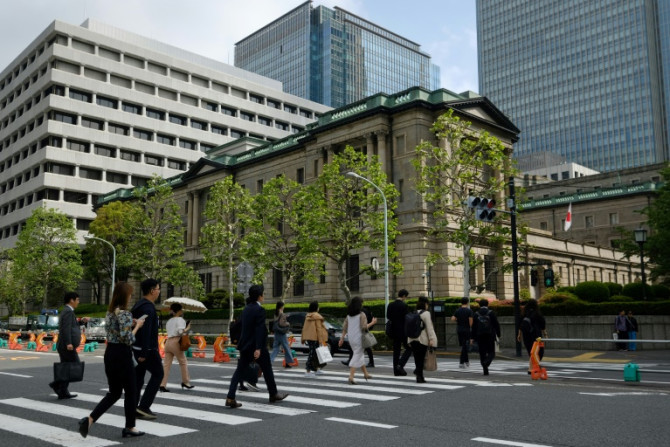By the end of March 2024, savings deposits witnessed an increase of 3% from or equivalent to AED 8.3 billion compared to about AED278.37 billion in February. It also increased by 5.1% in the first quarter, marking an increase from AED 272.8 billion at the end of 2023.
Monthly inflation in economically troubled Argentina came in at 4.2 percent in May, the lowest in two-and-a-half years, mainly due to a drop in consumption, the INDEC statistics agency said Thursday.
Britain's economy stagnated in April after emerging from recession in the first quarter of the year, official data showed Wednesday, dealing a setback to Prime Minister Rishi Sunak ahead of next month's general election.
Worries about upcoming US inflation data and the Federal Reserve's outlook for interest rates permeated Asian trading floors Wednesday.
European equities and the euro extended a sell-off Tuesday, fuelled by EU political uncertainty, while Asian markets also took a hit as investors looked ahead to inflation data and an interest rate decision in the United States.
Derided as "Club Med" nations during the European debt crisis 15 years ago, the economies of Spain, Greece and Portugal are now outperforming their northern peers thanks to a rebound in tourism.
Europe's stock markets and the euro slid Monday after far-right parties performed well in EU elections, prompting French President Emmanuel Macron to call a snap parliamentary poll and plunging the bloc into political turmoil.
Russia's central bank chief called Thursday for Russia to be an "open economy" despite the barrage of Western sanctions and trading restrictions it has been hit with over its Ukraine offensive.
Markets extended a surge on Wall Street Thursday as another round of soft US jobs data ramped up bets on the Federal Reserve cutting interest rates this year.
The European Central Bank is expected to begin cutting eurozone interest rates from historic highs this week, but sticky inflation means the move is unlikely to kickstart a rapid easing cycle.
Equities fell Wednesday on lingering worries about the outlook for US interest rates, while oil prices extended their gains after an attack on a ship in the Red Sea stoked fresh worries about supplies from the Middle East.
Shanghai has relaxed rules on buying property in the city, as local governments across China aim to ease an agonising real estate crisis that is dragging on the economy.
Markets fell in Asia and Europe on Friday, tracking a sell-off on Wall Street sparked by a string of better-than-expected US data that added to worries the Federal Reserve will hold off on cutting interest rates this year.
The pace of Japanese inflation slowed in April to 2.2 percent as gas bills fell, government data showed Friday, with the figure remaining above the Bank of Japan's two percent target.
Asian and European markets diverged Thursday after minutes from the Federal Reserve's most recent policy meeting indicated officials would keep interest rates elevated for some time as they struggle to bring inflation down to target.
Britain's annual inflation rate slowed to a near three-year low in April as energy prices cooled further, official data showed Wednesday, boosting the governing Conservatives before this year's general election.
Equities rose Monday, extending a rally in New York that saw the Dow close at a record high, with sentiment boosted by China's plan to support its struggling property sector and hopes for a US interest rate cut.
China cut the minimum down payment rate for first-time homebuyers on Friday and suggested the government could buy up commercial real estate, in some of Beijing's most ambitious moves yet to lift the ailing housing market out of an unprecedented debt crisis.
Japan's economy suffered a worse-than-expected contraction in the first quarter, official data showed Thursday, in further bad news for its unpopular government.
The central government will begin issuing some 30-year bonds on Friday as part of a planned sale of more than $138 billion of debt, according to a notice posted to the ministry's website.
The US Federal Reserve is expected to hold interest rates steady for a sixth straight meeting Wednesday, with a summer start to cuts looking less likely owing to stubborn inflation.
The yen surged after diving to a new 34-year low past 160 per dollar on Monday as a forecast-beating US inflation reading dented expectations for Federal Reserve interest rate cuts this year.
The Bank of Japan kept its ultra-low interest rates unchanged Friday and stopped short of signalling another hike, pushing the yen to a fresh 34-year low against the dollar.
The US economy cooled markedly in the first three months this year, expanding less than anticipated as consumer spending and exports decelerated, according to government data released on Thursday.
Equities were mixed Thursday as investors turned cautious after the past three days' sizeable gains, with Meta's warning that it will spend far more than expected this year fuelling worries that the latest tech-led rally may have gone too far.
London's FTSE 100 stocks index hit record highs Tuesday, catching up with major global peers which have struck all-time peaks this year as inflation cools.
Asian markets rose Monday, clawing back some of last week's losses, as Middle East worries subsided and traders looked ahead to the release of key US inflation data and corporate earnings.
Economies in the Middle East and North Africa face a "shadow of uncertainty" from ongoing tensions in the region, a senior IMF official told AFP on Thursday.
China's economy expanded far more than expected in the first quarter of 2024, data showed Tuesday, but disappointing retail and industrial figures suggested leaders face severe headwinds to hit their annual growth target.
China's economy is expected to have slowed in the first three months of the year as it continues to be buffeted by a debilitating property sector crisis and flagging consumer activity.

















































